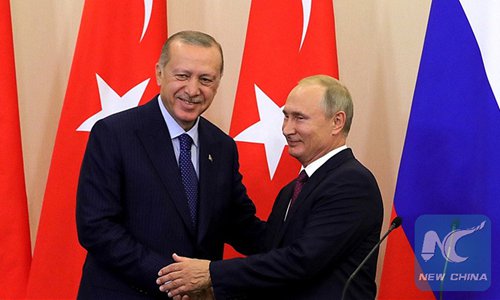HOME >> OPINION
Turkey’s purchase of Russian missile defense system won’t strain NATO ties
By Tian Wenlin Source:Global Times Published: 2019/7/21 19:38:40

Photo: Xinhua
Russia's first delivery of the Russian S-400 surface-to-air missile defense system arrived in Turkey on Wednesday, with more expected to arrive until July 23, the Hürriyet Daily News reported.
Turkey's move to purchase S-400 defense system is viewed as a sign of increasing strategic coordination with Russia while distancing itself further from the West and the US.
In the past, Ankara and Washington were allies. Yet a failed coup in 2016 aimed at overthrowing President Recep Tayyip Erdogan appeared to be a handiwork of Turkish military factions. But there were also murmurs that the US may have been involved.
Since 1987, Ankara has been applying for EU membership without achieving much progress. This has left Turkey disappointed. Now Turkey is shifting its focus to the East - expanding its influence in the Middle East and strengthening strategic cooperation with Russia. Today, Ankara and Moscow routinely cooperate on Syria and other Middle East issues.
The Russian S-400 missile system deal is a blow to NATO defense forces. Turkey is an important member of NATO. When NATO granted Turkey membership in 1952, its main objective was to defend against the Soviet Union. Today, the former NATO bridgehead against Soviet forces is now the outpost Russia uses to infiltrate NATO, undermining the organization's strategic and geopolitical patterns.
However, purchasing the S-400 system does not impact NATO. The deal is not a reason to pull the Islamic nation out of NATO or totally alienate it from Washington. What Russia can give Turkey is limited.
Experience shows that Turkey's policies have not always been consistent. When dealing with Washington, it plays the Moscow card and when negotiating with Russia, it plays the US card. The strategy allows Turkey to gain maximum benefits. Ankara's S-400 purchase is tactical, rather than strategic.
This incident will not affect NATO ties. Neither the US nor Turkey have a great desire to maintain close relations with each other. Washington believes Ankara's strategic value is declining. From Turkey's perspective, US policies in the Middle East, especially the policy to support the Kurds, run counter to Ankara's interests.
But both sides are reluctant to abandon their alliance. Turkey still has to rely on the world's greatest power on certain issues. The US does not have many allies in the Middle East. Aside from Israel and non-NATO Jordan, Turkey is the only US ally that is both a NATO member and an Islamic country.
Its strategic position is important as it sits at the junction between Europe and Asia. Washington would neither abandon Turkey nor confront it.
Turkey and other NATO members have blamed each other multiple times over refugees, human rights, and EU membership. They are seemingly in harmony but actually at variance.
However, unlike the US, EU countries do not sell Turkey missile systems. In the military and security arena, the US is more concerned with this latest purchase than the EU. Meanwhile, the EU has other problems that outweigh Turkey's acquisition of Russian missile defense systems.
The author is a research fellow at China Institutes of Contemporary International Relations. opinion@globaltimes.com.cn
Posted in: VIEWPOINT